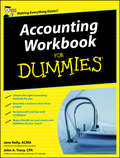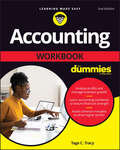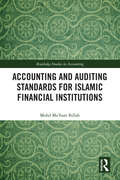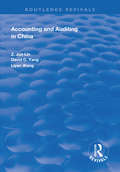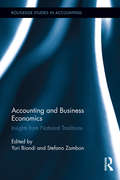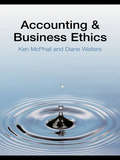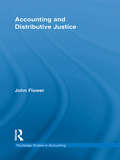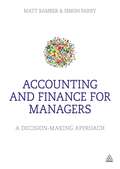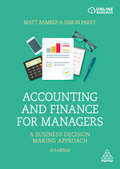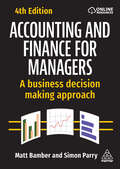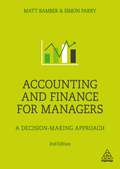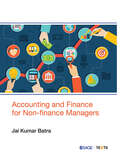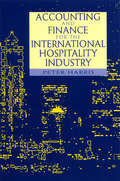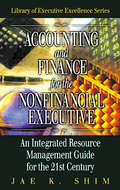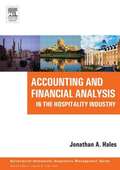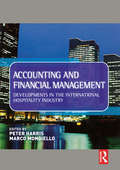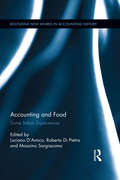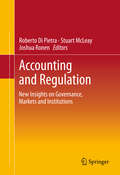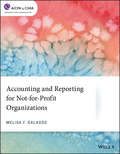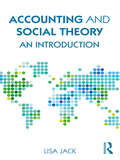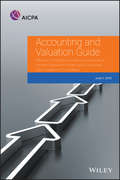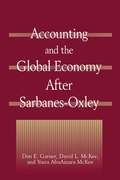- Table View
- List View
Accounting Workbook For Dummies
by Jane Kelly John A. TracyWant to become an accountant? Own a small business but need help balancing your books? Worried about managing your finances under the cloud of the recession?This hands-on workbook gets you up to speed with the basics of business accounting, including reading financial reports, establishing budgets, controlling cash flow, and making wise financial decisions. The question and answer sections encourage you to find your own solutions to challenging accounting problems - and there's plenty of space to scribble your workings out! Accounting Workbook For Dummies is the only book that makes truly light work of the financial fundamentals that many businesspeople try to bluff their way through every day.Accounting Workbook For Dummies, UK Edition covers:Part I: Business Accounting Basics Chapter 1: Elements of Business Accounting Chapter 2: Financial Effects of Transactions Chapter 3: Getting Started in the Bookkeeping Cycle Chapter 4: The Bookkeeping Cycle: Adjusting and Closing Entries Part II: Preparing Financial Statements Chapter 5: The Effects and Reporting of Profit Chapter 6: Reporting Financial Condition in the Balance Sheet Chapter 7: Coupling the Profit & Loss Statement and Balance Sheet Chapter 8: Reporting Cash Flows and Changes in Owners' Equity Chapter 9: Choosing Accounting Methods Part III: Managerial, Manufacturing, and Capital Accounting Chapter 10: Analysing Profit Behavior Chapter 11: Manufacturing Cost Accounting Chapter 12: Figuring Out Interest and Return on Investment Part IV: The Part of Tens Chapter 13: Ten Things You Should Know About Business Financial Statements Chapter 14: A Ten-Point Checklist for Management Accountants Main changes in the UK edition include:UK Accounting practiceCurrencyUK institutions - Inland Revenue and Customs and Excise etcNational Insurance, PAYEUK taxation and VATPartnerships and Limited company informationUK legal practiceUK specific formsUK specific case studies
Accounting Workbook For Dummies
by Tage C. TracyNumber nightmares in accounting? No more! The numbers are clear: the need for accountants is not only strong, but on the rise. With job growth projected to increase by 7% over the next 10 years, there&’s no time like the present to join this growing—and profitable—profession. Accounting Workbook For Dummies, 2nd Edition gives you the hands-on instruction you need to understand complicated concepts through demonstration problems, practice worksheets. and spreadsheets. Understand the role of accountants versus bookkeepers Develop knowledge to establish and maintain high quality accounting systems Dip your toes into accounting in the digital age Learn to properly interpret financial statements and reports Generate income statements, balance sheets, and cash flow statements Expand your knowledge on sources of business capital Learn how to improve profits and manage costs Understanding the intricacies of accounting has never been easier as in today&’s rapid-fire global economy, accountants have never been more important—it&’s all in your hands with this plain-English workbook!
Accounting and Auditing Standards for Islamic Financial Institutions (Routledge Studies in Accounting)
by Mohd Ma'Sum BillahWhile accounting and audit functions are significantly regulated and standardized in conventional financial industries and activities, through the implementation of International Accounting Standards, and International Financial Reporting Standards, as well as other international, regional, and local regulations, this is not the case for Islamic financial organizations. Rather than having their own set of comprehensive accounting or auditing standards or policies, these are based, in some cases, on the Accounting and Auditing Organization for Islamic Financial Institutions (AAIOFI), the Islamic Financial Services Board (IFSB)’s standards and Shari’ah based local policies. This book is a timely and comprehensive overview of accounting and auditing standards within the doctrine of Shari’ah. It offers a significant contribution to the field and a wealth of technical know-how. It analyzes Islamic accounting and auditing both in theory and practice and from a distinctly international perspective. The chapters are arranged in a systematic and logical way making it easily accessible and engaging. The book evaluates the existing standards and widens the scope of the discourse to include Maqasid al-Shari’ah, Islamic accounting and audit models and standards, as well as, offering practical policy recommendations. The author presents a Shari’ah justified solution to Islamic Accounting and Audit and offers guidance on overcoming the challenges to implementing Islamic Accounting and Auditing Standards. The book is a unique and exhaustive guide and, as such, will be an invaluable resource for academics, researchers, students, policymakers, as well as, practitioners in accounting and auditing firms and financial institutions.
Accounting and Auditing in China (Routledge Revivals)
by Z. Jun Lin David C. Yang Liyan WangFirst published in 1998, this book provides an updated introduction to accounting and auditing in China, incorporating the most recent developments up to June 1997. It covers all major aspects of Chinese accounting and auditing, including accounting administrative systems, qualifications and responsibility of Chinese accountants, accounting regulations or standards setting, cost and managerial accounting, financial reporting, statutory audit and public accounting, accounting for governments and non-profit organizations, business financing and taxation systems, EDP application in accounting, accounting education and research etc. Some of the main accounting and auditing legislation and standards are complied in the Appendix. The book will be an informative reference to readers, both business executives and professionals, outside of China. It can also be used as a textbook or teaching supplement for Universities and Colleges.
Accounting and Business Economics: Insights from National Traditions (Routledge Studies in Accounting)
by Yuri Biondi Stefano ZambonThe recent financial crisis has sparked debates surrounding the nature and role of accounting in informing capital markets and regulatory bodies about the financial performance and position of a firm. These debates have drawn attention to the broader implications of accounting for the economy and society. Accounting and Business Economics brings together leading international scholars to examine the current state of accounting theory and its fundamental connection with the economics and finance of firms, viewing the business entity from not only accounting, but also national, economic, social, political, juridical, anthropological, and moral points of view.
Accounting and Business Ethics: An Introduction
by Diane Walters Ken McPhailDespite the enormous impact of various accounting scandals on the accounting profession, the general malaise amongst the profession more broadly, and the significant legislative and institutional reforms that have taken place as a result, there are still surprisingly few textbooks on accounting ethics. This concise introductory text takes a broad view of ethics and accounting, taking into account contemporary social trends, such as globalization and terrorism. Rather than delineating codes of professional conduct, this text pushes the reader towards an understanding of the nature of ethical dilemmas and the factors that influence the ways in which accountants frame ethical questions. The book is divided into two parts. The first part focuses on developing thinking about the different kinds of ethical questions that could be posed in relation to accounting. The second part focuses more explicitly on accounting practice, exploring the ethical function of accounting in relation to the market economy, ethics in relation to the accounting profession, and the ethics of the international accounting harmonization project. Accounting and Business Ethics is a compact introduction aimed at both students and practitioners who want to understand more about the ethics of accounting.
Accounting and Distributive Justice (Routledge Studies in Accounting)
by John FlowerAccounting and Distributive Justice challenges the basic assumptions on which the current practice of financial reporting is based. It argues that the objective of financial reporting should be to contribute to the achievement of distributive justice and not the optimal allocation of resources as in the traditional capitalist paradigm. It explains in non-technical terms the principle philosophical theories of justice and argues that a firm has a moral responsibility to seek distributive justice in its dealings with its shareholders, employees, suppliers, customers, and other people with whom it has dealings, who are considered to be the firm’s stakeholders. The book introduces concepts of distributive justice to accountants and provokes them into reflecting on how the discipline of accounting can best serve the cause of justice. Accounting and Distributive Justice provides both a philosophical foundation and a practical game plan for the future of a more sustainable accounting practice.
Accounting and Emancipation: Some Critical Interventions (Routledge Studies In Accounting Ser. #Vol. 3)
by Jim Haslam Dr Sonja Gallhofer Sonja Gallhofer Professor Jim HaslamAccounting is a social practice: it should be evaluated in terms of its contribution to a notion of social well-being. In order to do this, this book elaborates a critique of contemporary accounting. The authors encourage those with a close interest in accounting to make the search for a more emancipatory and enabling accounting a core area of thei
Accounting and Finance for Managers
by Matt Bamber Simon ParryAccounting and Finance for Managers is a new text specifically designed to improve analytical skills and help readers use accounting and finance tools for managerial advantage. Ideal for self study as well as classroom learning, it includes worked examples throughout the chapters as well as real-world scenarios and full exercises at the end of each chapter. Providing coverage of basic bookkeeping, readers will learn how to interpret financial statements and grasp underlying theory, interpret a cash budget and identify potential problems, identify appropriate pricing strategies to fit different markets and products/services and incorporate financial evaluation into operational decision making and problem solving. With full supporting resources including lecture slides for each chapter and a breakdown of how each chapter relates to course structures, Accounting and Finance for Managers is essential reading for any student or manager.
Accounting and Finance for Managers: A Business Decision Making Approach
by Matt Bamber Simon ParryAccounting and Finance for Managers rebukes the myth that in order to excel in accounting and finance you need to be great at mathematics. Split into two broad sections which focus on financial accounting and management accounts, this textbook uses clear, accessible language that will appeal to students from a variety of academic backgrounds.Taking a uniquely practical approach that focuses on the financial aspects of business decisions, the textbook covers all the core topics of accounting and finance, including basic bookkeeping, financial analysis, business planning, cash-flow analysis and investment decisions. Now in its third edition, Accounting and Finance for Managers contains updates on new accounting standards and regulations, as well as featuring up-to-date real-world examples of real options, value chain analysis and competitive advantage analysis. This textbook features 'traditional' accounting practices in detail, but also covers topics with a strategic focus to ensure students learn to think in broader strategic terms. Written for an international audience using International Financial Reporting Standards (IFRS) terminology with supporting resources including additional exercise questions, curated further reading and lecture slides for each chapter.
Accounting and Finance for Managers: A Business Decision Making Approach
by Matt Bamber Simon ParryThe ideal textbook for business and management students needing to develop and understand accounting and finance skills. Taking a unique and practical approach that focuses on the financial aspects of business decisions, Accounting and Finance for Managers covers the core topics of accounting and finance. Now in its fourth edition, it includes new advice on budgetary control, outlining new techniques and emerging methods to help students understand how to make better business decisions.Featuring 'traditional' accounting practices in detail, Accounting and Finance for Managers covers topics with a strategic and accessible focus. With new content covering essential tools such as contribution and breakeven analysis and the growing presence of automation and machine learning, this is an essential textbook for business and management students on accounting and finance modules. Supporting online resources include additional exercise questions, curated further reading and lecture slides for each chapter.
Accounting and Finance for Managers: A Decision-Making Approach
by Matt Bamber Simon ParryAccounting and Finance for Managers is specifically designed for MBA, EMBA, MA and MSc Business and Management students who require a grounding in the key concepts of accounting and finance. Including real financial statements and worked examples from well-known businesses, as well as full exercises and questions at the end of each chapter, this accessible guide provides students with the financial tools and analytical skills for managerial advantage. Taking a uniquely practical approach that focuses on the financial aspects of business decisions, the book covers all the core topics of accounting and finance, including basic bookkeeping, financial analysis, business planning, cash-flow analysis, and investment decisions. Now in its second edition, Accounting and Finance for Managers contains updated examples and case studies from Burberry, Ryanair and Whitbread, new content on corporate governance and ratio analysis, reflective activities and a new chapter on financing decisions. Bonus online material includes guidance and teaching advice, additional questions and lecture slides for each chapter.
Accounting and Finance for Non-finance Managers
by Jai Kumar BatraDesigned for management students from a non-finance background, this book introduces the basic concepts of accounting and finance in an easy-to-understand manner. The book comprehensively covers the fundamental concepts of financial accounting, cost accounting, management accounting and financial management. It also introduces international accounting standards covering US GAPP and IFRS. Accounting and Finance for Non-finance Managers helps to develop the generic skills of application, problem-solving, evaluation and communication in the areas of accounting and finance to aid young managers in making appropriate business decisions. Key Features: Text and theory supported by numerous examples, diagrams, activities, solved illustrations, practice modules, unsolved exercises, case studies and suggestions for project work. Cases and examples extracted from newspapers, annual reports and financial reports of real-time companies to help practical understanding. Robust companion website including additional solved illustrations, test bank, PPTs and manuals for classroom teaching.
Accounting and Finance for the International Hospitality Industry
by Peter HarrisTop experts specializing in hospitality management have contributed articles to this new collection which explains recent developments in accounting and finance. The material is drawn from a combination of fieldwork and practical experience. The managerial emphasis means that the content is fully relevant internationally and not constrained by the legal framework of different countries. Accounting and Finance provides an overview of:*analysis and evaluation of performance *planning methods and techniques *financial information and control *financial management. It also shows how operational analysis can be used as a management tool to improve performance. Techniques for predicting the financial success or failure of hotels are suggested. Research into hotel companies in the US and Europe demonstrates key performance indicators used by hotel managers and financial executives. Other contributors explore the interface between accounting and marketing and human resource management and there is thorough coverage of financial strategy formulation. Readers will also find helpful the section on statistics in the analysis and prediction of cost behaviour in hotels.Contributors: Raymond Schmidgall (Michigan State University, USA); Debra J. Adams (Bournemouth University, UK); Professor Elisa S. Moncarz (Florida International University, USA); Richard N. Kron (Kron Hospitality Consulting, USA); Angela Maher (Oxford Brookes University, UK); Peter J. Harris (Oxford Brookes University, UK); Geoff S. Parkinson (BDO Stoy Hayward Chartered Accountants, UK); Paul Fitz-John (Bournemouth University, UK); Paul Collier (University of Exeter, UK); Professor Alan Gregory (University of Glasgow, UK); Tracy A. Jones (Cheltenham and Gloucester College of Higher Education, UK); Jacqueline Brander Brown (The Manchester Metropolitan University, UK); Nina J. Downie (Oxford Brookes University, UK): Catherine L. Burgess (Oxford Brookes University, UK); Ian C. Graham (Holiday Inn Worldwide, Belgium); Howard M. Field (International Hotel and Leisure Associates, UK); Professor Paul Beals (Canisius College, USA); Frank J. Coston (Pannell Kerr Forster Associates, UK).
Accounting and Finance for the NonFinancial Executive: An Integrated Resource Management Guide for the 21st Century
by Jae K. ShimHave you recently been promoted? Are you starting a new business? Do you suddenly find that you need to know more about finances than you ever expected, but have no time for formal training? If so, you need Accounting and Finance for the Non-Financial Executive. Whether you are a newly promoted middle manager or executive, a marketing manager of a
Accounting and Financial Analysis in the Hospitality Industry
by Jonathan A. HalesUnderstanding and applying accounting principles and financial analysis.
Accounting and Financial Management
by Peter Harris Marco MongielloAccounting and Financial Management: developments in the international hospitality industry presents new and innovative research and developments in the field of accounting and financial management as it relates to the work of managing enterprises and organisations in the international hospitality industry. The content contains contributions from a rich source of international researchers, academics and practitioners including, university and college lecturers, professional accountants and consultants and senior managers involved in a wide range of teaching, scholarship, research, and consultancy in the hospitality industry worldwide. The material is drawn from their work and experience and relates directly to the management of hospitality undertakings. Therefore the up to date case studies and examples used are taken from a wide ranging of companies across the industry including large international chains such as Sheraton, Holiday Inn, and Intercontinental. Divided into three parts: Performance Management, Information Management and Asset Management the book tackles the following issues amongst others:* Performance management in the international hospitality industry* Benchmarking: measuring financial success* The profit planning framework* Making room rate pricing decisions* Hotel asset management UK and US perspectives* Lowering risk to enhance hospitality firm valueAccounting and Financial Management: developments in the international hospitality industry presents current developments drawn from a combination of live fieldwork and practical experience and therefore will content will appeal to a wide-ranging readership including practising managers and financial controllers in hospitality organisations, professional accountants and consultants, postgraduate candidates studying for master's degrees in hospitality management, and final year undergraduate students of hospitality management who elect to take an accounting option.
Accounting and Food: Some Italian Experiences (Routledge New Works in Accounting History)
by Roberto Di Pietra Massimo Sargiacomo Luciano D'AmicoThe interrelations between accounting and food have been hitherto neglected at an international level. This regret is particularly meaningful with regards to Italy, where 'Food', besides being a physiological need to satisfy, is one of the main pillars of the 'Made in Italy' Industry, and the so-called Italian life-style, which has become a part of the popular culture. Accounting and Food seeks to explore the accounting, business and financial history of some of the most prestigious Italian food producers. Moreover, given that "Food" has been at the center of production and trade throughout the history of mankind, food production and commerce will be investigated from the critical angles of accounting, accountants and merchants. Relatedly, the interconnected history of the Food fairs and expositions of the major Italian trade centers will be also unveiled. Accounting and Food examines the role of accounting, accountants and merchants in food production and international trade (e.g., grain, wine, etc...) as well as considering the history of food producers, paying particular attention to the role played by women entrepreneurs over time. Finally the book explores the interrelations of accounting, food and state, local authorities and social institutions, in particular in so far these latter institutions were involved in the Political economy, regulation, allocation and distribution of food to populations and societies. Accounting and Food will be of particular interest to researches and scholars in the field of accounting history but also to those working in the areas of regional development, regional economics, food and sociology and other related disciplines.
Accounting and Industrial Relations: Some Historical Evidence on Their Interaction (Routledge Library Editions: Accounting)
by Philip BougenThis study considers some of the factors which led to the emergence of accounting in the structure and practices of industrial relations in one particular company over a substantial period of time. It addresses the question as to the roles accounting numbers and systems were called upon to play in the conduct of industrial relations. The book also examines the effects of accounting practice and discourses upon industrial relations and explores the nature of a reciprocal type of influence. The research is based upon the Manchester engineering firm of Hans Renold and focuses on the decision to introduce a profit-sharing scheme within the company in 1920. The study examines the origins of this managerial initiative and its subsequent performance over a 10 year period.
Accounting and Order (Routledge Studies in Accounting)
by Mahmoud EzzamelThis book draws on ancient Egyptian inscriptions in order to theorize the relationship between accounting and order. It focuses especially on the performative power of accounting in producing and sustaining order in society. It explores how accounting intervened in various domains of the ancient Egyptian world: the cosmos; life on earth (offerings to the gods; taxation; transportation; redistribution for palace dependants; mining activities; work organization; baking and brewing; private estates and the household; and private transactions in semi-barter exchange); and the cult of the dead. The book emphasizes several possibilities through which accounting can be theorized over and above strands of theorizing that have already been explored in detail previously. These additional possibilities theorize accounting as a performative ritual; myth; a sign system; a signifier; a time ordering device; a spatial ordering device; violence; and as an archive and a cultural memory. Each of these themes are summarized with further suggestions as to how theorizing might be pursued in future research in the final chapter of the book. This book is of particular relevance to all accounting students and researchers concerned with theorize accounting and also with the relevance of history to the project of contemporary theorizing of accounting.
Accounting and Regulation: New Insights on Governance, Markets and Institutions
by Roberto Pietra Stuart Mcleay Joshua RonenSince 1998, the world's leading experts on accounting and regulation have convened in a series of workshops to explore and analyze emerging issues in the field. They have covered a wide array of topics, including corporate governance, auditing, financial disclosure, international standards boards, and the dynamics of markets and institutions. Most recently, they have focused on the role that accounting practices and policies may have played in the global financial crisis of 2008. In this volume, the editors showcase contributions from the workshops that represent the full spectrum of issues and perspectives relating to accounting and regulation. Each paper incorporates the most current examples and references to reflect the latest insights, with an emphasis on exploring future implications for theory and research, practice, and policymaking.
Accounting and Reporting for Not-for-Profit Organizations (AICPA)
by Melisa F. GalassoThis title provides the tools necessary to go beyond the theory and create value-added services for accountants&’ clients. In the not-for-profit arena. This book allows readers to examine, evaluate, and perform case studies, which will enhance their working knowledge of fundamental not-for-profit accounting and reporting, presentation requirements, note disclosures unique to not-for-profits, and options allowed under generally accepted accounting principles. Key topics include: Financial statement presentation, including FASB's financial reporting standard Statement of activities Statement of financial position and statement of cash flow Note disclosures Contribution concepts Functional expense and allocation of costs Endowments Operating versus non-operating Split interest agreements and beneficial trusts Agency transactions Programmatic investments Common financial statement mistakes
Accounting and Social Theory: An introduction
by Lisa JackIs society possible without accounting? In speech or in writing, we communicate actions, plans and decisions using numbers, calculations, words and images. Although accounting research is dominated by quantitative analyses, the role of accounting in society is firmly established over thousands of years. In this concise book, Lisa Jack demonstrates the power of social theory in expanding the value of accounting research. Accounting and Social Theory: An introduction includes advice on research problems as well as guidance on fertile areas for new research. The tools, techniques and developments covered by the author help readers to see social research in accounting as the study of the use, misuse and abuse of accounting communications by people and the effects that this has on social relationships. Stories of accounting in war, agriculture and food, gender, health and other areas illustrate the ways in which the threads of accounting run through society. Having emerged from the author’s wealth of teaching experience, this book provides a student-focused treasure trove that illuminates the field for early-career researchers in accounting and established academics looking to expand the impact of their work.
Accounting and Valuation Guide: Valuation of Portfolio Company Investments of Venture Capital and Private Equity Funds and Other Investment Companies (AICPA Accounting and Valuation Guide)
by AicpaDeveloped for preparers of financial statements, independent auditors, and valuation specialists, this guide provides nonauthoritative guidance and illustrations regarding the accounting for and valuation of portfolio company investments held by investment companies within the scope of FASB ASC 946, Financial Services —Investment Companies, (including private equity funds, venture capital funds, hedge funds, and business development companies). It features16 case studies that can be used to reason through real situations faced by investment fund managers, valuation specialists and auditors, this guide addresses many accounting and valuation issues that have emerged over time to assist investment companies in addressing the challenges in estimating fair value of these investments, such as: Unit of account Transaction costs Calibration The impact of control and marketability Backtesting
Accounting and the Global Economy After Sarbanes-Oxley
by Don E. Garner David L McKee Yosra AbuAmara McKeeThis book is essential for students and practitioners in accounting, international business, finance, and economics. In a straightforward and readable style, it focuses on the changing accounting and auditing standards in national and global economies in the post-Enron/Arthur Andersen era. The authors clarify the reasons behind and consequences of the accounting profession's failure in auditing and self-regulation, as most firms placed consulting profits ahead of public audit duties. They show how Sarbanes-Oxley solutions, while not perfect, are major contributors to the profession's redemption, and have enabled it to rise to new heights of service and revenue. The book offers a detailed examination of accounting practitioners' past challenges and future prospects. It provides a realistic analysis of specific issues facing accounting and auditing firms today, including the growing problem of independence; the need for one set of international accounting standards and one set of auditing standards; adjustments facing the global financial system; and the impact of the Internet and communication systems on accounting firms.
